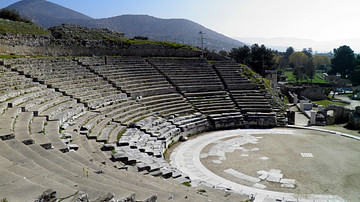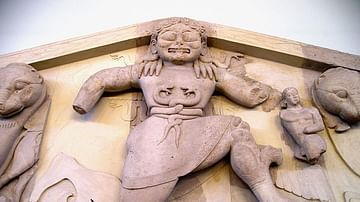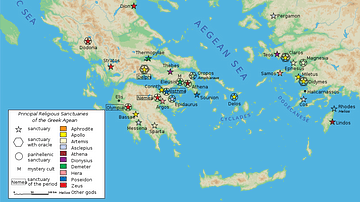Search
Search Results

Definition
Diogenes of Sinope
Diogenes of Sinope (l. c. 404-323 BCE) was a Greek Cynic philosopher best known for holding a lantern (or candle) to the faces of the citizens of Athens claiming he was searching for an honest man. He rejected the concept of "manners" as...

Article
Macedonian Colonization Under Philip II
Philip II of Macedon (359-336 BCE) envisaged a broad Macedonian kingdom and his colonial expansion resulted in the forging of an empire that his son Alexander the Great (r. 336-323 BCE) would use as a springboard for even greater things...

Definition
Corcyra - The Ancient City-State of Corfu
Corcyra (modern Corfu and also known as Kerkyra) located in the Ionian sea is one of the northern most Greek islands and was an important polis or city-state in the Archaic and Classical periods. Possessing a significant naval fleet and controlling...

Definition
Herakleia Lynkestis
Herakleia Lynkestis (Heraclea Lyncestis; Ἡράκλεια Λυγκηστίς) was a city in the ancient kingdom of Macedon not far from modern Bitola, founded c. 358 BCE by Philip II of Macedon (r. 359-336 BCE) as a governing centre for his new expansions...

Definition
Isthmia
Isthmia is a genitive noun with the meaning 'of the Isthmus.' It generally refers to the site that held the famous Isthmian Games near Corinth on the Isthmus. A natural assembly place for many Greeks and travellers. Isthmia in Antiquity was...

Definition
Demetrius I of Macedon
Demetrius I of Macedon, also known as Demetrios Poliorcetes, the 'Besieger' (c. 336 - c. 282 BCE), was a Macedonian king who, along with his father Antigonus I, fought for control of Alexander the Great's empire in the 'Successor Wars'. After...

Definition
Athens
Athens, Greece, with its famous Acropolis, has come to symbolize the whole of the country in the popular imagination, and not without cause. It not only has its iconic ruins and the famous port of Piraeus but, thanks to ancient writers, its...

Definition
Ancient Argos
Ancient Argos, located in the Peloponnese in Greece, was a major Mycenaean settlement in the Late Bronze Age (1700-1100 BCE) and remained important throughout the Greek, Hellenistic, and Roman periods until its destruction by the Visigoths...

Definition
Peace of Westphalia
The Peace of Westphalia, the name given to the multiple treaties, marked the conclusion of the Thirty Years' War. Signed on 24 October 1648, it aimed to secure political autonomy for the multitude of small states that made up the Holy Roman...

Definition
Nazi-Soviet Pact
The Nazi-Soviet Pact, also called the Molotov-Ribbentrop Pact after the respective foreign ministers of the USSR and Germany, was a non-aggression agreement signed in August 1939. The pact allowed the leader of Nazi Germany Adolf Hitler (1889-1945...